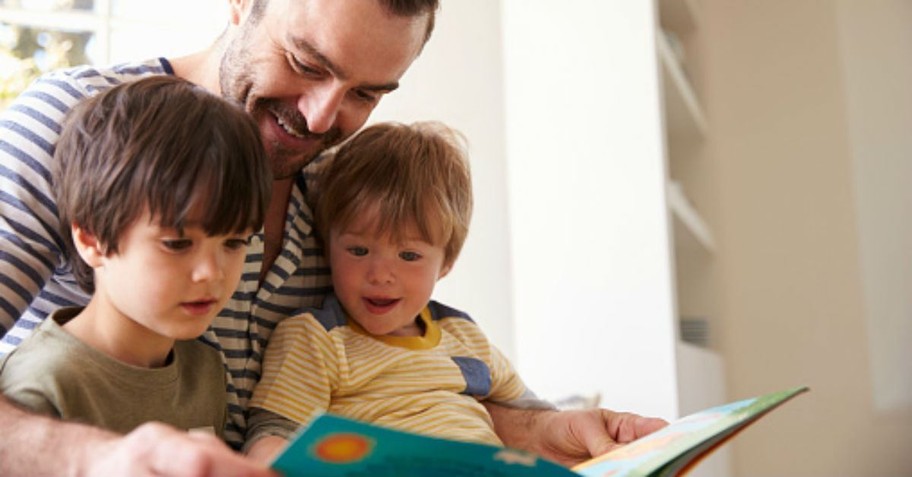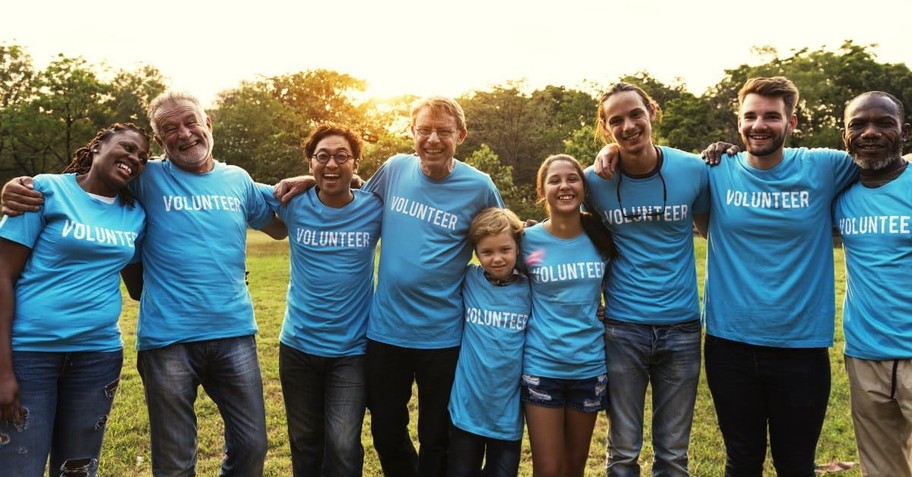7 Ways to Talk to Your Kids about Immigration

In my new book You Welcomed Me: Loving Refugees & Immigrants Because God First Loved Us, I share how the way we respond to the immigrant and refugee crisis—whether we decide to be “for them or against them”—will shape what kind of family, community, and country we want to be. As a parent myself, this response begins on the family level. I can’t say I truly care about the practice of welcome if I’m not living it out and modeling it as a father.
Hot-button political issues like this can feel daunting to discuss with our children, but we shouldn’t avoid it. There is so much more at stake than politicians debating over cable news. For others, real lives are impacted daily. For ourselves, intentionally choosing how to respond to in our own daily lives will help shape us into who God calls us to be.
That’s why Aimee Fritz and I created the You Welcomed Me Family Toolkit (available here) to provide parents with simple ways to grow as a welcoming family. Based on that, here are seven practical ways to engage your children on these topics and grow together in welcoming.
Photo courtesy: ©Thinkstock/imtmphoto

1. Discuss the news together.
Kids pick up on more than we realize. With refugee and immigrant issues so heavily in the news, odds are they have heard things on TV, at school, at church, or from you that they don’t fully understand. Whether it’s in the car, at the dinner table, or while playing ping-pong, ask your children questions like: Have you heard anything new about refugees or immigrants these days? Who did you hear it from? Listen carefully, affirm their feelings about what they’re hearing, help fill in any knowledge gaps, and answer questions they may have.
Photo courtesy: ©Thinkstock/GeorgeRudy

2. Listen to stories together.
Sometimes the scope of the news can feel overwhelming, distant, or even inappropriate for younger audiences. Forced migration can then start to feel like a theoretical issue rather than the personal reality lived and experienced by millions. Books are a great way to engage these topics in a more personal, relatable way that helps us recognize God in others.
Here are a few books we recommend to help your children engage the crisis by letting someone’s experience get in their heart and head:
-Picture books: All Are Welcome (Katherine Penfold), Strictly No Elephants (Lisa Mantchev) and The Big Umbrella (Amy June Bates)
-Middle-grade books: Wishtree (Katherine Applegate), Nowhere Boy (Katherine Marsh), and Refugee (Alan Gratz)
- Additionally, you can find refugee stories on the websites of most major refugee organizations (a full list can be found here).
When you read these stories out loud together as a family, make it a time of curiosity (maybe try a new snack from the country you’re reading about) and learning, not no-fun homework. After reading, invite their questions and look up answers together if you don’t know the answers.
Photo courtesy: ©Thinkstock/monkeybusinessimages

3. Practice welcome by welcoming together.
Make the concept of welcoming more tangible by thinking through what it looks like in your immediate neighborhood. As a family, write down the names of all the neighbors you can remember. Start with those who live closest to you and keep going farther out. Include pets. Add anything you remember about their front door or yard. Add the last time any of you talked with them on the phone or in person. Add the last time you had them in your house.
How many neighbors have you welcomed? If someone has moved in recently, make a family plan to welcome them: 1. On a store-bought or kid-made card, write, “GLAD WE’RE NEIGHBORS!” 2. Include your names, phone number, street address, and kids’ ages. 3. Bring a gift (ideas in activity #3 of the Family Toolkit). 4. Ring the doorbell and welcome them in person.
Photo courtesy: ©Thinkstock

4. Volunteer together.
Don’t just talk about it—do something. After talking and hearing stories together, you can show your kids how to respond to others’ suffering by coming up with ways your family can help.
Here are some ideas to get you started: Volunteer with language tutoring or after school programs for refugee and immigrant children; raise and give money to organizations or ministries that serve these populations; organize your family, church, or neighborhood to serve at a ministry or organization that helps these populations; welcome a refugee or refugee family into your home.
Write down your ideas and at the bottom of the list ask a child to write, “Lord, which one would you like our family to do?” Put it on the fridge. Pray about it every day as a family at breakfast or dinner. After a week, make a special dessert and talk about this as a family and circle the one you choose. Commit to do it together that month. Keep the list on the fridge until it’s done.
Photo courtesy: ©Thinkstock

5. Pray for empathy together.
Understanding the reality and feeling it are two different things. To help your children develop empathy, here are a few questions to encourage your children to put themselves in the place of refugees: If our family had to live in a different country, what do you think would be the hardest part? (New language? New foods? New home? Missing people from your old home?) It’s scary to think about, but what if our home was taken away and we had nowhere to sleep? How would you feel? What would you do? What would you want people to do to help you?
Acknowledge that sometimes it can be overwhelming to try to think about such hard things, but if we believe God hears us (and we do!), then prayer is invaluable. In our Family Toolkit we include this prayer to say together with your children to help them begin to enter into the experiences of others:
Lord, I’m overwhelmed by the sad refugee and immigrant stories I’m hearing. I’ve been spared from the traumas of war, violence, danger, and family separation. I don’t know how to process it. Help our family to look at the pain of others with courage and grace, tethered to the truth of your goodness. Thank you for sending Jesus as the perfect example of empathy and entering in. Amen.
Photo courtesy: ©Thinkstock/freedom007

6. Speak our anxieties or fears out loud to each other.
Refugees and immigrants must cross real, physical borders to reach us, but often we must cross our own kinds of borders to be able to welcome them. I begin the chapter in You Welcomed Me on acknowledging real concerns with this St. Francis of Assisi quote: “Where there is love and wisdom, there is neither fear nor ignorance.”
It’s so easy in our polarized world to dismiss the concerns of anyone who disagrees with us, or even the concerns we may have ourselves. But these aren’t simple situations, and if we want to move forward it’s essential to acknowledge complications and challenges. As we learn more and embrace what it means to welcome, we’ll learn that some of our fears were unreasonable, while others are important to consider so we can welcome generously and wisely.
Photo courtesy: ©Thinkstock/Wavebreakmedia

7. Read the Bible together.
The Bible has lots to say about welcoming! It tells a story of liberation, yes, but also of wandering, of homelessness, of seeking, and of being immigrants and refugees in strange lands searching for a home. By reading familiar (or less familiar!) Bible stories together through this lens, we can discover what God has to say about welcome and allow these stories to shape our hearts to be more like his.
Here are some passages to read together and discuss as a family: Matthew 25:35-40 (“when I was a stranger you welcomed me”), Luke 10:25-37 (Good Samaritan), Psalm 46 (God is our refuge), Galatians 3:28, Leviticus 19:33-34, and Deuteronomy 10:16-23 (God’s rules for treating foreigners), Hebrews 13:2 and Genesis 18:1-10 (holy hospitality).
Read each story several times, having a few family members take a turn. After you read through the passage a few times, ask questions that encourage your children to imaginatively inhabit the story. For example, have them identify setting and characters, ask them to pick characters they like most and least and explain why, and ask what sensory details they imagine. Answer any questions they might have, or consult a resource to find answers together. End with prayer to help you make the lessons of the story real in your lives.
Photo courtesy: ©Thinkstock/Halfpoint

It's Worth Welcoming
I hope these seven suggestions are practical, joyful ways you can engage with your kids on one of the most important topics in our country and world. As a family, it’s okay if we stumble (of course we will!) as long as we’re moving forward guided by love and faith. God’s love can guide us. God’s grace will hold us. We’ll grow together. And as a family our lives can be changed when we hear Jesus say to us, “I was a stranger, and you welcomed me.”
For more on this subject from the Evangelical Immigration Table, check out:
WHAT DOES THE BIBLE SAY ABOUT IMMIGRATION?
THE GREAT COMMANDMENT: APPLYING THE BIBLE TO CARING FOR REFUGEES AND IMMIGRANTS?
HOW IMMIGRANTS FIT INTO THE BODY OF CHRIST AND THE LOCAL CHURCH
"GO AND MAKE DISCIPLES" - DOES THE GREAT COMMISSION APPLY TO IMMIGRATION?
HOW TO RESPECT THE GOD-GIVEN DIGNITY OF EVERY IMMIGRANT
WHY GOD WANTS US TO PROTECT THE FAMILY UNIT OF IMMIGRANTS AND REFUGEES
HOW SHOULD CHRISTIANS RESPOND TO ILLEGAL IMMIGRATION?
WHAT DOES THE BIBLE SAY ABOUT BORDER SECURITY AND SHOULD CHRISTIANS SUPPORT THEM?
Kent Annan is director of humanitarian and disaster leadership at Wheaton College and author, most recently, of You Welcomed Me: Loving Refugees and Immigrants Because God First Loved Us.
Photo courtesy: ©Thinkstock/manop1984
Originally published January 31, 2019.








